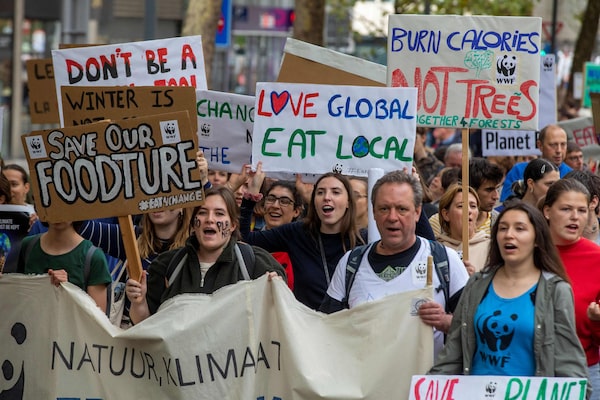If you’re reading this on the web or someone forwarded this e-mail newsletter to you, you can sign up for Globe Climate and all Globe newsletters here.
Good afternoon, and welcome to Globe Climate, a newsletter about climate change, environment and resources in Canada.
The Amazing Race – and more than a dozen regional spin-offs, including The Amazing Race Canada – has entered its 34th season.
But this year more than ever, people are becoming increasingly aware of their environmental impact. Sam Denby wanted to address it. He is the creator of Jet Lag: The Game, inspired by the Amazing Race, which aired on YouTube and premiered during the pandemic. A key difference is the show foregrounds its environmental impact by prominently displaying the amount of carbon offsetting done to make up for any air travel. Their most recent season is nearly entirely train-based, as part of a way to use less carbon-intensive planes.
Now, let’s catch you up on other news.

Sam Denby (left) and other contestants on season one of 'Jet Lag: The Game', a travel competition show that airs on streaming service Nebula and YouTube.
Noteworthy reporting this week:
- Indigenous initiatives: Three B.C. First Nations announce co-ordinated climate response for effects of industrial development on their traditional territories. Also: Cedar LNG would raise B.C. emissions, but fight climate change globally, say regulator
- Business: Nova Scotia’s wine industry forced to adapt to the changing rules of a warming climate
- Extreme weather: Hurricane Fiona the most costly extreme weather event recorded in Atlantic Canada, insurers say. Also: Nova Scotia dreams of a grid able to handle such storms
- Energy: Suncor’s chief climate officer Martha Hall Findlay to retire after less than a year on the job
- Investing opinion: Mark Carney’s fraying green banking alliance highlights the risks of voluntary measures. More investing stories below
- From The Narwhal: With old traditions and new tech, young Inuit chart their changing landscape
A deeper dive
A different kind of European souvenir
Adam Radwanski is The Globe’s climate policy columnist. For this week’s deeper dive, he talks about his energy take-aways from a trip to Europe.
As Canadians, we’re conditioned to view ambitious climate policy as inherently politically controversial, with opponents painting it as being at odds with economic self-interests. And it often seems impossible to reach consensus on it, because we live in a federation featuring 10 provinces and three territories with divergent interest.
So it was striking to spend time recently in Brussels, the de facto capital of the European Union. This weekend, I reported on what I found there.
The EU’s 27 member countries are hardly politically simpatico on everything, including their immediate response to the generational energy crisis caused by Russia’s invasion of Ukraine. But they’re on the verge of finalizing a sweeping new green deal that aims to rapidly decrease their fossil-fuel reliance.
It includes a big scale-up of carbon pricing (and introducing tariffs on imports from places without comparable policies), and highly ambitious binding targets for renewable electricity generation and reductions in overall energy usage.
There are key differences between there and here, of course. Unlike Canada, the EU is not a major producer of oil and gas. So it has a stronger argument that shifting to other fuel sources will build self-sufficiency.
It’s also true that there’s still haggling over the climate package’s fine print. And as I reported, emerging political dynamics – around both short-term energy measures, and the rise of right-wing populists in Italy and Sweden – won’t make it easier to get across the finish line.
But if EU officials prove correct that by early 2023 they can finalize the deal’s key legislative measures, it will be a remarkable achievement that countries like ours dismiss at our peril.
Alongside hundreds of billions of dollars in new climate spending set to flow in the United States after the passage of the Inflation Reduction Act, the EU strategy should dramatically speed up the energy transition. Actions by individual EU countries, in response to the current crisis, could contribute even more to that acceleration.
I’ll be reporting on that soon, after spending the bulk of my European visit in Germany.
The EU’s industrial powerhouse is paying for eyebrow-raising past decisions to over-rely on Russian gas and phase out nuclear power, which has led to much finger-wagging elsewhere. But already further along than most countries in developing clean-energy plans, it’s now trying to rapidly remove barriers to going faster.
There will be lots of lessons to draw from Germany alone, as it puts its muscle behind a climate-friendly transformation that will become increasingly pressing in Canada for economic competitiveness if not moral reasons.
But for now, the EU may be about to send a signal – about how little time there is for squabbling as planetary and domestic imperatives intersect – that we need to hear as much as anything.
- Adam

People take part in the "Walk for Your Future" climate march, in Brussels, on October 23, 2022.NICOLAS MAETERLINCK/AFP/Getty Images
What else you missed
- Months-long drought on B.C.’s Sunshine Coast prompts water ban, climate anxiety. Rain did arrive in southern B.C., but more than 100 millimetres still needed to erase drought
- Business Council of Canada urges Chrystia Freeland to focus on energy in fall fiscal update
- Vancity to offer carbon footprint tracker for its Visa credit cards
- David Suzuki to retire from CBC’s The Nature of Things in the spring
- Oxfam pegs Canadian bank-financed emissions at 1.9 billion tonnes in 2020
- First Nations, environmentalists tired of government stonewalling over selenium probe
- Trudeau guarantees this time Canada will meet its emissions target
- Aurubis, Europe’s biggest copper smelter, tests ammonia for low-carbon copper product output
- Germany hails first delivery of ‘green’ hydrogen from UAE
- Flooding in Nigeria spreads to the Delta, upending lives and livelihoods
Opinion and analysis
Marsha Lederman: Climate activists have landed themselves in the soup
Grant Bishop: Taxpayers should not be on the hook for companies’ pollution
Green Investing
As calls grow for a doubling or tripling of Canada’s electricity generation capacity, some utilities have other ideas
Plans for widespread adoption of electric vehicles, heat pumps and electric arc furnaces imply surging demand for electricity.
But Canada’s major utilities aren’t preparing for anything of the sort. Nor are major planning bodies such as Ontario’s Independent Electricity System Operator and the Alberta Electric System Operator telling them to. That’s the main take-away from annual reports and planning outlooks published by these organizations and reviewed by The Globe and Mail, and interviews with decision makers within these organizations. Read the latest in-depth report from data reporter Matthew McClearn.
- Corporate climate disclosures jump again in 2022, CDP data show
- Investors file lawsuit against Volkswagen over climate-change related lobbying disclosures
- BlackRock tells British parliamentary committee that it will not stop investing in coal, oil and gas
- Busting five myths about responsible investing
- ‘Green hushing’ on the rise as companies keep climate plans from scrutiny
Making waves
Each week The Globe will profile a Canadian making a difference. This week we’re highlighting the work of Erika Reyes reducing plastic pollution.

Erika Reyes, founder for InwitHandout
I am Erika Reyes, 34, living in Toronto and working as the founder for Inwit solution. Seven years ago, I became an environmentalist by accident after watching a documentary about plastic pollution. I saw the image of a little seabird full of single-use plastics. Every piece was colourful and branded; in a moment, it showed me my personal impact.
At Inwit, we are Canada’s First Zero Waste Takeout App. We believe reusing in the takeout industry can become the gateway to a sustainable future. We work to empower our community to take climate action and supporting local restaurants.
To become an activist, you only need to be active. Focus on baby steps, and do things that bring joy to your life. For example, try a new vegetarian recipe if you want to eat less meat. I know firsthand that people who are not taking climate action today are not evil or don’t care. They are like me seven years ago, waiting for their moment of inspiration.
- Erika
Do you know an engaged individual? Someone who represents the real engines pursuing change in the country? Email us at GlobeClimate@globeandmail.com to tell us about them.
Photo of the week
Truman Big Swallow, of the Blood Tribe Land Management department, carries buckets of water along a dry creek bed on the Kainai First Nation in southern Alberta during their work to protect the grasslands and watersheds near Stand Off , Alta., Wednesday, Oct. 5, 2022.Jeff McIntosh/The Canadian Press
Guides and Explainers
- Want to learn to invest sustainably? We have a class for that: Green Investing 101 newsletter course for the climate-conscious investor. Not sure you need help? Take our quiz to challenge your knowledge.
- We've rounded up our reporters' content to help you learn about what a carbon tax is, what happened at COP 26, and just generally how Canada will change because of climate change.
Catch up on Globe Climate
- Yukon River Chinook salmon decline is a cultural, spiritual loss
- The environmental cost of electrification
- Storm surge is why Hurricane Fiona hit so hard, and it will get worse
- Why getting women and girls in the fishing boat is good for the environment
We want to hear from you. Email us: GlobeClimate@globeandmail.com. Do you know someone who needs this newsletter? Send them to our Newsletters page.
 Sierra Bein
Sierra Bein